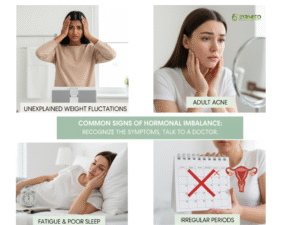How To Treat Hormonal Imbalance To Get Pregnant Naturally in 2025

10 Effective Ways to Treat Hormonal Imbalance and Get Pregnant Naturally
How to treat hormonal imbalance to get pregnant naturally is a common worry for many women who dream of starting a family. Your hormones play a big part in your body’s work, like controlling your monthly cycle and helping you ovulate. When they are out of balance, it can make it hard to conceive. But the good news is, you can make changes in your daily life to fix this. In this article, we will look at what causes this problem, signs to watch for, and natural steps to help you get back on track. We draw from trusted sources and what other fertility sites share to give you the best tips.
What Is Hormonal Imbalance and How Does It Affect Your Fertility?
Hormones are like messengers in your body. They tell your organs what to do. For women, key hormones like estrogen, progesterone, and thyroid hormones help with ovulation and preparing your womb for a baby. When these are not in balance, it can stop you from releasing an egg each month or make your cycle irregular.
This imbalance can come from many things. For example, stress from work or life can raise cortisol, a hormone that throws off others. Being too heavy or too thin can also change how your body makes hormones. Conditions like PCOS, where cysts grow on ovaries, often cause high levels of male hormones and make periods skip. If you have thyroid issues, it might slow down your metabolism and affect fertility too.
Why does this matter for getting pregnant? Balanced hormones help your eggs grow well and your uterus get ready for implantation. Without balance, you might not ovulate, or the egg quality could be low. But many women find ways to fix this naturally before needing doctor help.
What are common signs of a hormonal imbalance?
 You may not know your hormones are off until you try to get pregnant. Look for these common signs. Irregular periods are a big clue – maybe they come too often or skip months. You could feel very tired all the time, even after sleep. Mood swings, like feeling sad or angry for no reason, happen too.
You may not know your hormones are off until you try to get pregnant. Look for these common signs. Irregular periods are a big clue – maybe they come too often or skip months. You could feel very tired all the time, even after sleep. Mood swings, like feeling sad or angry for no reason, happen too.
Common signs of Hormonal Imbalance include:
-
Irregular or missed periods: Cycles that are inconsistent often indicate problems with ovulation.
-
Sudden weight gain or difficulty losing weight: Hormones regulate metabolism; imbalances can lead to stubborn fat storage.
-
Acne or oily skin: Excess androgens can increase oil production and cause breakouts.
-
Thinning hair or hair loss: Often linked to thyroid disorders or high androgen levels.
-
Mood swings and depression: Hormonal changes affect serotonin and stress levels.
-
Fatigue and poor sleep: Low thyroid or progesterone levels may reduce energy.
-
Low libido or vaginal dryness: Reduced estrogen or testosterone can impact sexual health.
-
Hot flashes or night sweats: Indicate unstable estrogen levels.
Other signs include weight gain that won’t go away, acne on your face, or extra hair growth where you don’t want it. Trouble sleeping or low sex drive can point to this problem as well. If you notice these, talk to your doctor. But remember, simple changes can help a lot.
Causes of Hormonal Imbalance in Women Trying to Conceive
Many things can cause your hormones to go out of balance. Stress is a top one – it makes your body produce too much cortisol, which blocks other hormones. Poor diet, like eating too much sugar or processed foods, can lead to insulin issues and affect your cycle.
Major causes of hormonal imbalance include:
-
Polycystic Ovary Syndrome (PCOS): A condition that increases androgen levels and prevents regular ovulation.
-
Thyroid disorders: Both underactive and overactive thyroid glands affect reproductive hormones.
-
High stress levels: Chronic stress raises cortisol, which can suppress reproductive hormones.
-
Unhealthy diet: Nutrient deficiencies or processed foods can disturb hormone regulation.
-
Excessive exercise or low body weight: These reduce estrogen and stop ovulation.
-
Environmental toxins: Chemicals like BPA and pesticides can mimic or block natural hormones.
-
Aging: After age 35, natural hormonal shifts can reduce fertility.
-
Certain medications: Some drugs interfere with the body’s hormone production.
Not getting enough sleep messes with melatonin and other hormones. Exposure to chemicals in plastics or beauty products can act like fake hormones in your body. Age plays a role too – as you get older, hormone levels change naturally. Medical issues like diabetes or thyroid problems add to it. Knowing the cause helps you choose the right fixes.
How to Treat Hormonal Imbalance to Get Pregnant Naturally Through Diet
One of the best ways to treat hormonal imbalance to get pregnant naturally is by changing what you eat. Food gives your body the building blocks for hormones. Focus on whole foods like fruits, vegetables, and lean proteins. A Mediterranean diet works well – it includes olive oil, fish, nuts, and greens. This helps lower inflammation and balance blood sugar.
Eat more fiber from beans and whole grains to help remove extra estrogen. Cut down on sugar and white bread to keep insulin steady. Add healthy fats from avocados and seeds – they support hormone making. Drink plenty of water and try herbal teas like spearmint for PCOS.
Here is a simple table of foods to include and avoid:
| Foods to Eat | Why They Help | Foods to Avoid | Why They Harm |
|---|---|---|---|
| Salmon | Rich in omega-3 for hormone balance | Sugary drinks | Raise insulin and disrupt cycles |
| Broccoli | Helps detox extra hormones | Fried foods | Add bad fats that cause inflammation |
| Eggs | Provide protein for egg health | Processed meats | Have chemicals that mimic hormones |
| Berries | Antioxidants protect cells | Caffeine excess | Can stress your adrenal glands |
At EIRMED, we have natural supplements with these nutrients to make it easier for you.
Exercise: A Key Step in How to Treat Hormonal Imbalance to Get Pregnant Naturally
Moving your body helps balance hormones. Aim for moderate exercise like walking or swimming, 30 minutes most days. This lowers stress and helps with weight, which affects hormones. Yoga is great – it calms your mind and boosts blood flow to your reproductive organs.

Avoid hard workouts that tire you out too much, as they can raise cortisol. Strength training with light weights builds muscle and helps insulin work better. Listen to your body – if you feel good after exercise, it’s helping your fertility.
Sleep and Its Role in Hormone Health
Good sleep fixes many hormone issues. Your body repairs during rest. Lack of sleep raises cortisol and lowers melatonin, which affects fertility. Make a bedtime routine – no screens an hour before bed.
Keep your room cool and dark. If you wake up often, try relaxing teas. Better sleep means better hormone balance and higher chances to conceive.
Are hormone levels impacted by age?
Yes, hormone levels naturally change with age, and this can significantly influence fertility. As a woman grows older, her ovaries gradually produce fewer eggs and lower amounts of estrogen, progesterone, and other reproductive hormones. This shift typically begins in the early 30s and becomes more noticeable after 35. Reduced hormone levels can make ovulation less regular and decrease egg quality, making it more difficult to conceive naturally.
Here’s how age impacts hormone levels and fertility:
-
Decreased estrogen and progesterone: These hormones decline with age, leading to irregular menstrual cycles and weaker uterine lining preparation.
-
Reduced FSH sensitivity: The ovaries become less responsive to Follicle-Stimulating Hormone (FSH), causing slower egg development.
-
Fewer viable eggs: The number of eggs (ovarian reserve) decreases over time, limiting chances of conception.
-
Higher risk of hormonal fluctuations: Hormone patterns become inconsistent, sometimes leading to missed or shorter periods.
-
Increased chance of early perimenopause: Some women experience hormone-related changes earlier due to genetics or lifestyle.
Maintaining a healthy lifestyle, managing stress, and following a balanced diet can help support hormonal health as a woman ages.
(Sources for your better knowledge: NHS, Cleveland Clinic, PubMed Central)
Could it be that changes in my menstrual cycle are just the start of menopause?
Changes in menstrual patterns can sometimes be early signs of perimenopause, the transition phase before menopause. During this time, the ovaries gradually produce less estrogen and progesterone, which leads to irregular cycles and other symptoms. While occasional irregular periods can also result from stress or thyroid imbalance, persistent cycle changes after age 40 often signal the beginning of perimenopause.
Common signs that may indicate early menopause or perimenopause include:
-
Irregular or skipped periods: Cycles may become shorter, longer, or unpredictable.
-
Hot flashes and night sweats: Sudden feelings of heat due to fluctuating estrogen levels.
-
Sleep problems: Hormonal changes can cause insomnia or restless nights.
-
Mood swings or irritability: Estrogen affects serotonin, so its decline impacts mood.
-
Vaginal dryness or discomfort: Lower estrogen reduces natural lubrication.
-
Decreased fertility: Ovulation becomes less frequent, reducing the chances of pregnancy.
If these symptoms persist, it’s best to consult a healthcare provider to confirm whether the cause is perimenopause or another hormonal imbalance.
(Sources for your better knowledge: Mayo Clinic)
Should I seek medical attention for a hormonal imbalance even if I’m not trying to get pregnant?
 Yes, it is important to address hormonal imbalances even if pregnancy is not a current goal. Hormones regulate far more than fertility—they influence mood, metabolism, heart health, bone strength, and cognitive function. Leaving a hormonal imbalance untreated can increase the risk of long-term health issues such as thyroid disease, osteoporosis, or metabolic disorders.
Yes, it is important to address hormonal imbalances even if pregnancy is not a current goal. Hormones regulate far more than fertility—they influence mood, metabolism, heart health, bone strength, and cognitive function. Leaving a hormonal imbalance untreated can increase the risk of long-term health issues such as thyroid disease, osteoporosis, or metabolic disorders.
Reasons to seek medical help for hormonal imbalance include:
-
Persistent irregular periods: Could indicate thyroid or ovarian disorders.
-
Unexplained weight changes: Often linked to hormonal or metabolic dysfunction.
-
Severe acne or excessive hair growth: May signal excess androgen production.
-
Chronic fatigue or mood swings: Can result from thyroid or adrenal imbalances.
-
Early signs of menopause: Medical advice can ease symptoms and protect long-term health.
-
Family history of hormonal disorders: Regular checkups help in early detection and management.
Getting blood tests and professional evaluations ensures early diagnosis and helps maintain hormonal balance throughout life.
(Sources for your better knowledge: Cleveland Clinic)
How do you treat hormonal imbalances if I’m trying to get pregnant?
Treating hormonal imbalance while trying to conceive focuses on restoring the natural rhythm of ovulation and supporting overall reproductive health. The treatment depends on the underlying cause—whether it’s PCOS, thyroid disorder, stress, or poor nutrition. Many women benefit from combining lifestyle changes with medical treatments that help regulate hormone levels and promote natural conception.
Common treatment and management approaches include:
-
Lifestyle modifications: A balanced diet, adequate sleep, and regular exercise can naturally improve hormone regulation.
-
Stress management: Techniques like yoga, deep breathing, or meditation reduce cortisol levels that interfere with ovulation.
-
Balanced diet: Include zinc, iron, healthy fats, and vitamins (especially B-complex and D) to support reproductive hormones.
-
Medical treatments: Doctors may prescribe medications such as clomiPHENE citrate (Clomid) to trigger ovulation or metFORMIN to manage insulin resistance in PCOS.
-
Thyroid and prolactin correction: If imbalances exist, medication can restore normal levels and improve fertility chances.
-
Herbal or natural supplements: Some women use supplements like Vitex (Chasteberry) under medical guidance to regulate menstrual cycles.
-
Maintaining healthy body weight: Both underweight and overweight conditions disturb estrogen and progesterone balance.
With proper diagnosis and consistent management, many women successfully restore hormonal balance and conceive naturally or with minimal medical assistance.
(Sources for your better knowledge: Mayo Clinic, Cleveland Clinic)
Real life Successful Case studies/Patient stories
1. Treating my hormonal imbalance helped me get pregnant: Jennifer Blossom
Jennifer, a 30-year-old wellness blogger and occupational therapist, struggled with infertility for about 2.5 years. She discovered through hormone testing that she had a hormonal imbalance, which was partly due to overexercising and under-eating (which disrupted her menstrual cycle). After consulting her doctor, she followed a treatment plan involving supplements, lifestyle adjustments, and medical oversight. Eventually, she conceived her first child. For her second pregnancy, having better knowledge of her body and hormones made conception quicker.
-
Key takeaways:
• Hormone testing helped identify hidden imbalances
• Tailored treatment (diet, stress, supplements) can help restore fertility
• Understanding your body helps speed future conception
2. A functional medicine approach: Julie’s story
Julie, 32, had a history of heavy, painful periods, PMS, endometriosis, and had tried three rounds of IVF without success. She also had Hashimoto’s (thyroid autoimmune disorder). In functional medicine evaluation, the practitioner addressed not just hormones but also diet, inflammation, thyroid support, gut health, and lifestyle. The holistic approach helped rebalance her hormones, relieve symptoms, and improve her fertility outlook.
-
Key takeaways:
• Addressing coexisting conditions (like thyroid) is critical
• Diet, inflammation control, and systemic support matter, not just reproductive hormones
• A broader approach can complement conventional fertility treatments
Diana’s PCOS Success with Natural Remedies
Diana struggled with PCOS for years without regular monthly cycles. She used natural progesterone cream (topically), improved her nutrition (including vitamin D), and followed fertility-supportive suggestions (herbal and lifestyle adjustments). Soon after implementing those changes, she became pregnant naturally.
-
Key lessons:
• Natural progesterone in some cases can help restart cycles
• Addressing lifestyle, diet, and nutrient deficiencies matters
• Success sometimes follows persistent, stepped efforts
Here is a recommended YouTube video
In this video, Dr. Uthuman discusses how hormonal imbalances can lead to infertility and shares ways to identify symptoms of hormonal problems. She explains common hormone issues that affect fertility (like irregular cycles, progesterone insufficiency, thyroid or androgen problems) and offers strategies to correct those imbalances naturally and medically—such as nutrition, lifestyle changes, and targeted therapies.
Video Title: HOW TO GET PREGNANT WITH HORMONAL IMBALANCE
FAQs | How to Treat Hormonal Imbalance to Get Pregnant Naturally
What can I do to conceive if I have hormonal imbalance and irregular periods?
Irregular periods often mean your hormones like estrogen and progesterone are off, which can stop ovulation. To help naturally, start with a balanced diet full of veggies, fruits, and healthy fats like nuts and fish. These foods support your body’s hormone making. Exercise gently, like walking or yoga, to lower stress and keep your weight steady. Aim for 7-9 hours of sleep each night, as poor rest raises cortisol, a stress hormone that throws off others. Track your cycle with apps to spot ovulation days. If you have PCOS, try supplements like inositol after checking with a doctor – it can help regulate insulin and cycles. Many women see better periods in 3-6 months with these changes, raising pregnancy odds.
Are there natural methods to improve fertility and balance hormones without medical treatments?
Yes, lifestyle tweaks can help a lot. Eat foods rich in fiber, like beans and whole grains, to clear extra estrogen from your body. Cut down on sugar and processed snacks to keep blood sugar even, which aids hormone balance. Drink herbal teas like spearmint to lower male hormones if you have PCOS. Move your body with fun activities, but don’t overdo it – too much hard exercise can raise stress hormones. Manage worry with deep breaths or time in nature. Herbs like Chasteberry may help cycles, but start low and watch for side effects. Avoid plastics with chemicals that mimic hormones. These steps can boost egg quality and make conception easier over time.
What are the causes of hormonal imbalances that affect female fertility?
Common causes include stress, which boosts cortisol and blocks ovulation hormones. Poor eating, like too much junk food, can mess with insulin and lead to weight gain, worsening the issue. Conditions like PCOS cause high androgens, making periods skip. Thyroid problems slow your body and affect egg release. Not enough sleep or exposure to toxins in products can act like fake hormones. As you age, levels drop naturally. Fixing the root, like better diet or less stress, often helps restore balance for better fertility.
Can hormonal imbalances cause infertility in women, and how do I fix it naturally?
Hormonal imbalances can stop you from ovulating or make your womb lining thin, leading to infertility. For natural fixes, focus on weight – being too heavy or thin affects hormones. Lose or gain slowly with whole foods and movement. Take vitamins like B6 for progesterone support and D for overall hormone health. Practice yoga to improve blood flow to your ovaries. Limit caffeine and alcohol, as they stress your adrenals. If it’s PCOS-related, Maca root might help balance, but talk to a pro first. Many women conceive after 3 months of these habits.
What are some natural tips for getting pregnant with PCOS and irregular cycles?
For PCOS, cut carbs to manage insulin, which often causes hormone spikes. Eat anti-inflammatory foods like salmon for omega-3s to calm your system. Try acupuncture – it may regulate cycles by boosting blood flow. Supplements like magnesium and zinc support progesterone, key for pregnancy. Track fertile days with kits. Reduce stress with meditation, as it lowers androgens. Avoid dairy if it worsens symptoms. These can help ovulate more often, upping your chances.
How do I balance hormones naturally to increase progesterone for pregnancy?
Low progesterone can make it hard for a baby to stick. Boost it with seeds like sesame in the second half of your cycle. Take vitamin C-rich foods like berries to support your adrenals. Avoid over-exercising; choose gentle walks. Herbs like Vitex (Chasteberry) can raise progesterone over time. Get good sleep in a dark room. If needed, add a B-complex vitamin. These steps help your body hold a pregnancy better.
What foods help with female hormonal imbalance for better fertility?
Eat cruciferous veggies like broccoli to detox extra hormones. Add avocados for healthy fats that build hormones. Berries fight inflammation. Whole grains keep blood sugar steady. Nuts and seeds provide zinc for ovulation. Avoid fried foods and sugar. A Mediterranean-style diet works best for fertility. Drink water and green tea. These choices can balance hormones in weeks.
What natural supplements can help balance hormones for conception?
Inositol for insulin control in PCOS. CoQ10 for egg health. Omega-3s from fish oil reduce swelling. Vitamin D if you’re low – it aids hormone work. Maca root for overall balance. Always check doses with a doctor, as too much can harm. Start slow and track changes.
How long does it take to balance hormones naturally for pregnancy?
It often takes 3-6 months with steady changes like diet and exercise. Your body needs time to adjust. Track symptoms and cycles. If no improvement, see a fertility doctor for tests.
When should I see a doctor if natural ways aren’t working?
If you’ve tried for 6-12 months without luck, get checked. Tests can spot issues like thyroid or PCOS. Natural ways help many, but some need extra support like meds to ovulate. Early help raises success rates.
Overall Purpose
The purpose of this article is to educate women about how hormonal balance directly affects fertility and natural conception. It explains the key hormones involved in reproduction, the common signs and causes of hormonal imbalance, and how these imbalances can interfere with ovulation, egg quality, and menstrual cycles.
The article also highlights how age impacts hormone levels, how menstrual changes may signal perimenopause, and why it’s important to seek medical help for hormonal issues even outside pregnancy planning. Finally, it provides insights into effective treatments and natural methods to restore hormone balance, helping women improve their chances of getting pregnant naturally and maintain long-term reproductive health.
Disclaimer
This content is for information only and not medical advice. Always see a doctor before changing your diet, exercise, or taking supplements. EIRMED products are to support health, but results vary. We do not promise cures. Talk to your healthcare provider about your fertility concerns.
Thank You
Thank you for reading this guide on how to treat hormonal imbalance to get pregnant naturally. We hope these tips help you feel more hopeful on your path to parenthood. At EIRMED, we are here to support you with quality products. Share your story with us!

Eirmed is an informational platform dedicated to providing reliable, science-based insights on male and female fertility, reproductive health, and natural conception.

I loved as much as you will receive carried out right here The sketch is tasteful your authored subject matter stylish nonetheless you command get got an edginess over that you wish be delivering the following unwell unquestionably come further formerly again as exactly the same nearly very often inside case you shield this hike
I just wanted to express my gratitude for the valuable insights you provide through your blog. Your expertise shines through in every word, and I’m grateful for the opportunity to learn from you.